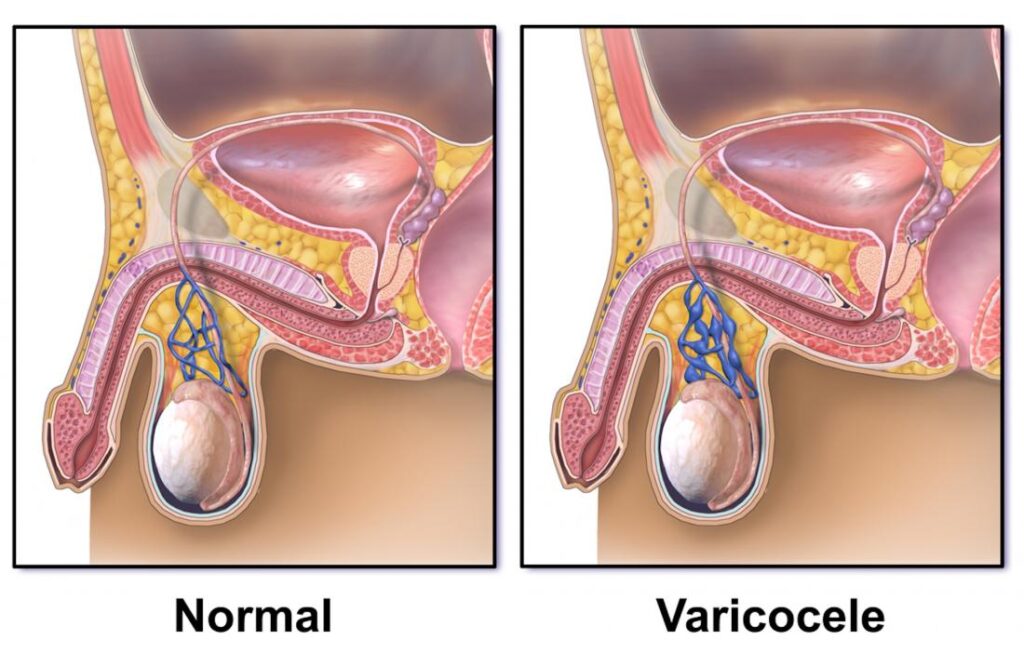
Introduction
Male reproductive health often gets overlooked—until it becomes a concern. One such condition that silently affects many men is varicocele. It’s a condition where the veins inside the scrotum enlarge, disrupting blood flow and potentially leading to fertility issues.
While medical treatments exist, a natural, proactive approach is often the best first step. By making some key adjustments to your lifestyle, you can reduce your risk and support your reproductive system. This article covers the Top 5 Habits for Preventing Varicocele and Boosting Fertility—practical changes every man can start today.
What Is a Varicocele?
A varicocele is essentially a varicose vein in the scrotum. It occurs when blood pools due to malfunctioning valves in the veins that transport blood away from the testicles. This buildup increases heat in the scrotal area and can damage sperm production, quality, and testosterone levels.
Common symptoms include:
-
A dull ache or discomfort in the scrotum
-
A feeling of heaviness or swelling
-
Enlarged, visible veins (often described as looking like a “bag of worms”)
-
Testicle shrinkage or asymmetry
-
Difficulty in conceiving
The condition can develop during puberty or adulthood and usually affects the left testicle more than the right due to vein positioning.
Why Prevention Matters
Varicoceles can worsen over time. In some cases, they remain harmless, but in others, they can lead to low sperm counts, reduced motility, or infertility. Preventing varicocele, or stopping its progression, is possible with small but consistent lifestyle changes.
Let’s explore the top 5 daily habits that are proven to help.
1. Move More, Sit Less
One of the simplest yet most powerful habits is staying physically active. Sedentary behavior reduces blood circulation and puts pressure on the lower abdomen, which can contribute to varicocele formation.
What to Do:
-
Exercise daily: Aim for at least 30 minutes of moderate activity like walking, swimming, or yoga.
-
Take breaks: If your job involves long hours of sitting, stand up every 30–60 minutes.
-
Stretch your pelvis: Hip and lower abdominal stretches improve blood flow to the groin area.
Physical activity not only helps in preventing varicocele but also boosts testosterone and improves sperm quality.
2. Eat for Vein and Hormone Health
Your diet plays a critical role in maintaining vascular integrity and hormonal balance. Foods rich in antioxidants, healthy fats, and key minerals support reproductive organs and reduce inflammation.
Add These to Your Diet:
-
Vitamin C-rich foods (oranges, strawberries, bell peppers): strengthen vein walls
-
Zinc-rich foods (pumpkin seeds, lentils, eggs): boost testosterone and sperm production
-
Omega-3 fatty acids (salmon, walnuts, flaxseed): fight inflammation and improve circulation
-
Fiber (vegetables, fruits, oats): helps prevent constipation, which contributes to varicocele
Avoid:
-
Excessive caffeine and alcohol
-
Processed foods and trans fats
-
High-sodium meals
A diet rich in whole foods directly supports both fertility and vein health.
3. Avoid Heat and Pressure in the Groin Area
Heat is the enemy of sperm production. The testicles are naturally positioned outside the body to maintain a lower temperature. External heat and pressure can raise scrotal temperatures and impair reproductive function.
How to Stay Cool:
-
Avoid hot baths, saunas, or placing laptops on your lap
-
Wear loose-fitting cotton underwear
-
Sleep in breathable, non-restrictive clothes
-
Don’t stay in the same sitting position for too long
Maintaining a cooler scrotal environment helps prevent varicocele aggravation and keeps sperm functioning at their best.
4. Manage Stress and Sleep Well
Stress raises cortisol levels, which can suppress reproductive hormones. Lack of sleep worsens this problem by impairing your body’s natural repair processes. A chronically stressed or sleep-deprived body becomes vulnerable to inflammation and hormonal imbalance—both contributing factors in varicocele progression and infertility.
Tips to Improve Mental and Hormonal Health:
-
Practice mindfulness: Meditation, deep breathing, or yoga
-
Stick to a sleep schedule: Aim for 7–9 hours each night
-
Unplug before bed: Avoid screens at least 30 minutes before sleep
-
Limit blue light exposure at night
Your mental health is directly tied to your physical health, especially your hormonal and reproductive function.
5. Support Digestive Health and Avoid Constipation
Chronic constipation increases abdominal pressure, which strains the veins in your lower pelvis and scrotum. Over time, this pressure can contribute to the development or worsening of varicocele.
Healthy Bowel Habits:
-
Eat more fiber: Include greens, fruits, legumes, and whole grains
-
Hydrate well: Drink at least 2–3 liters of water per day
-
Exercise: Movement helps stimulate bowel function
-
Avoid straining: Never force bowel movements; go when the urge arises naturally
Good gut health contributes to vascular health, which in turn protects against varicocele.
Bonus Tips: Other Helpful Habits
While the top 5 habits are key, here are a few more to boost your efforts:
-
Don’t smoke: Smoking damages blood vessels and lowers sperm quality.
-
Limit alcohol: Excess drinking affects liver function and hormone regulation.
-
Wear supportive underwear during sports to reduce vein strain.
-
Check in with a urologist if you notice any changes in your testicles.
When to See a Doctor
If you’re experiencing symptoms like pain, swelling, visible veins, or fertility issues, it’s time to consult a specialist. A simple physical exam or scrotal ultrasound can detect varicocele.
In severe cases, a procedure called varicocelectomy may be recommended. It’s minimally invasive and often improves sperm health and testosterone levels.
That said, early lifestyle changes remain the most effective prevention method—especially for mild or asymptomatic cases.
Conclusion
Varicocele may be common, but it’s not inevitable. With the right daily habits, you can significantly reduce your risk and improve your fertility. The Top 5 Habits for Preventing Varicocele and Boosting Fertility—staying active, eating well, staying cool, managing stress, and avoiding constipation—are simple yet powerful.
These habits don’t just protect you from varicocele; they enhance your overall well-being and reproductive health. If you’re trying to conceive or simply want to take care of your body, now is the time to act.





